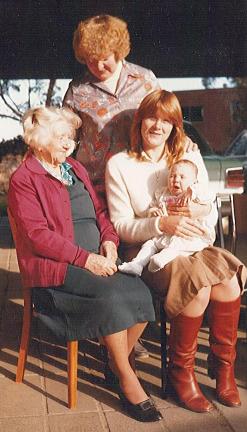I have just studied the subject Creating and Preserving Digital Content through Charles Sturt University for the successful completion of the Master of Information Studies. And it has got me thinking….
All of those family photos held in a variety of forms in a variety of containers need some sorting. There are old printed photographs in photo albums and in boxes. There are digital photographs that reside in cameras, phones, devices, SD cards, CD’s, and computers. There are digital copies of photos sitting in random digital file folders on computers. And we keep producing more each day adding to the digital heap.
So now I know how to go about organising all of this stuff, I need the time to actually sit down and apply myself to the mammoth task of sorting it out.
Once I comprehend the enormity of the task I begin to ask myself – why? For what purpose? Who cares? How many photographs of wind-swept beach scenes are too many?
Then there is the question of the integrity of the captured image: if a filter is applied to an image from a Smartphone app then this should be noted in the metadata or description. But that adds another level of tedium to the task, and yet if it is not done then what does that say about the authenticity of the resulting image. Is it then art or photography? Or both?
The notion of transience emerges too when considering the purpose of such an exercise. With ease and speed of connected social media channels through smart devices, a photo shared across networks among friends and family is enjoyed for the moment, in the context of that moment, and then swept into the ever-moving stream of data creation. Sure it is still ‘there’ somewhere in the digital ether, waiting to be retrieved for future embarrassment; like a baby photo shown by smirking parents at their child’s 21st birthday party. Other than for nostalgic amusement, is there value in spending so much time and effort in sorting out the family photos for ‘the future’?
I can hear the archivists and historians stirring on their leather chairs, leaning forward, fingers cracking, ready to post a heart-felt reply. I welcome it because I need a good reason to justify this effort.
The term ‘digital dark age’ was used in Creating and Preserving Digital Content to illustrate a possible scenario where data is lost through poor preservation techniques. I get it. I wrote an essay about it, elaborately describing the scenes from the original movie version of The Time Machine, where the vacuous stares of the future Eloi people are the result of lost knowledge from crumbling pages in books left to decay.
I appreciate the words of former Prime Minister Harold Holt at the Stone Ceremony March in 1966:
“We cannot understand the present or plan for the future without the knowledge of the past.”
 And yet significant family portraits containing four females spanning four generations might be worthy of preservation for sharing amongst immediate and future family members, but how many “selfie’s” must we have to delete before we gain a representative portrait of one individual.
And yet significant family portraits containing four females spanning four generations might be worthy of preservation for sharing amongst immediate and future family members, but how many “selfie’s” must we have to delete before we gain a representative portrait of one individual.
My thoughts are a jumble between process, content, and value. The process is complex and needs to be worked out to establish some kind of system that works and fulfills preservation standards. The content contains so many variables and raises questions about authenticity. The value is difficult to judge because it is not easy to project into the minds of some future person and decide if this image is worth the effort of the time invested in preserving it.
This article about one family’s preservation project describes some of these issues with a heart-warming narrative and a positive outcome, but concluding that it is “never done.”
My aim is to begin. I have the relevant information about how to approach the task. I have a large external hard-drive. I will gather the photos in all forms. I will start sorting, naming, describing, storing, backing-up, and hopefully one day in the future I will have some kind of result that’s purpose will be apparent.
In the words of Francis Kilvert, as quoted from this article: Digital Curation and the Citizen Archivist by Richard Cox:
“Why do I keep this voluminous journal? I can hardly tell. Partly because life appears to me such a curious and wonderful thing that it almost seems a pity that even such a humble and uneventful life as mine should pass altogether away without some record such as this.”
Cox, R. J. (2009). Digital Curation and the Citizen Archivist. Digital Curation: Practice, Promises & Prospects. pp. 102-109. http://d-scholarship.pitt.edu/2692/


